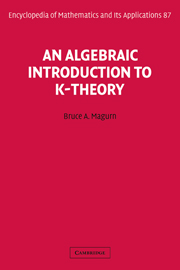Part II - Sources of K0
Published online by Cambridge University Press: 05 May 2013
Summary
Projective modules are of some interest as natural generalizations of free modules, but generalizations become significant when they connect objects already under study. In Chapter 7 we find that the integral domains R whose ideals are f.g. projective R-modules are the rings of primary interest in algebraic number theory. And in Chapter 8 the rings, all of whose modules are projective, turn out to be the gateway to the matrix representations of finite groups.
In connection with these two types of ring are two abelian groups that are precursors of K0(R). Pinpointing the historical origin of K0 is like locating the source of a great river; there are many tributaries along the way, and the identity of the true source can be a subjective judgement. I propose that the source of K0 is the ideal class group, described in quite modern terms by Dedekind in 1893. We consider the class group in Chapter 7. The origin of K0 of noncommutative rings is perhaps the ring of virtual characters of finite groups. This subject has an equally long history, going back to Frobenius in the 1890s (with earlier roots due to Dirichlet, Dedekind, and Kronecker), but it recognizably enters the stream of K-theory in the 1960 paper of Swan, “Induced Representations and Projective Modules.” We develop character theory in Chapter 8.
Information
- Type
- Chapter
- Information
- An Algebraic Introduction to K-Theory , pp. 203 - 204Publisher: Cambridge University PressPrint publication year: 2002
